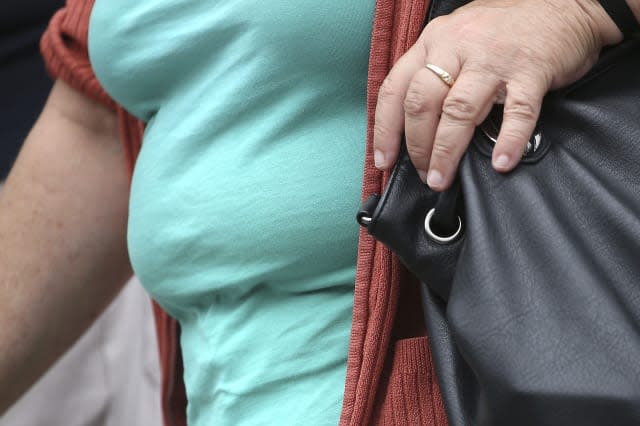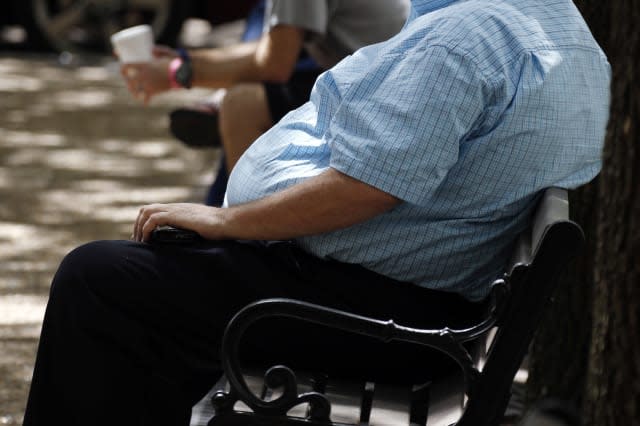Pay workers to lose weight

Workers could be rewarded with cash or shopping vouchers if they lose weight under NHS-backed plans to tackle the obesity crisis.
Employers will be urged to offer incentives to staff who shed pounds as part of efforts to ease the strain placed on the system by fat patients.
Moves to tackle obesity are part of a "radical" shake-up of the healthcare system in England in the next parliament proposed by NHS bosses. Other measures include tax cuts for volunteers and "breaking down the boundaries" between GPs and hospitals.
Officials warned of "severe consequences" for patients unless the overhaul is implemented and appealed for a boost in funding from the next government.
NHS England chief executive Simon Stevens said: "We have no choice but to do this. If we do it a better NHS is possible, if we don't the consequences for patients will be severe."
Bruce Keogh, national medical director of NHS England, said the NHS remains "one of the best healthcare systems in the world" but added: "We've squeezed the orange really hard over the last four years. People working in the NHS are really beginning to feel the pressure."
Article continues below

Mr Stevens said the tax-payer funded health system has led to a "blind spot" about the healthcare of employees, and workplace schemes to encourage weight loss have been largely ignored despite success abroad.
He said: "The principal point is that employers in many countries have developed voluntary schemes for their employees whereby for example you actually get cash back based on participation in Weight Watchers or other type schemes.
Asked what sorts of rewards could be offered, he said: "It could be shopping vouchers, it could be cash, it could be prizes." Incentives could be higher or lower depending on the amount of weight a participant loses, he added.
It is understood the NHS plans to "challenge" firms to bring in such schemes rather than offer them money.
Mr Stevens said obesity is "getting worse in some respects" and described the issue among children as "a significant future health threat".
He said: "When your son or daughter starts primary school one in 10 children are obese. By the time they reach Year 6 that's doubled to one in five so something is going wrong with the way in which we are keeping our children healthy and setting them up for a good start in life."
NHS staff will also be urged to "set a national example". There are plans to cut access to unhealthy products on NHS premises and"measure" the health and wellbeing of staff.
An emphasis on addressing the root causes of ill health such as poor diets, alcohol consumption and smoking was set out in Five Year Forward View, published today by the NHS.
The report said:"The future health of millions of children, the sustainability of the NHS, and the economic prosperity of Britain all now depend on a radical upgrade in prevention and public health.
"Put bluntly, as the nation's waistline keeps piling on the pounds, we're piling on billions of pounds in future taxes just to pay for preventable illnesses."
It said a warning set out in a report by Sir Derek Wanless 12 years ago has not been heeded and "the NHS is on the hook for the consequences".
Article continues below

The report says that towards the end of the next parliament the NHS may be able to achieve annual efficiency savings of 3% if its plan is implemented.
However, bosses stressed that even if this target is achieved, there may still be a funding gap of £8bn and said an increase in funding from the next government of inflation plus 1.5% would be needed to plug the gap.
David Bennett, chief executive of health services regulator Monitor, said: "If we get the investment we need and a limited amount of adjustment of funding we see no reason at all why it's not possible to sustain a comprehensive tax-funded NHS which is actually better for patients and an NHS which really is fit for the 21st century."
The report also proposes a number of new care models including:
The creation of new bodies to provide GP and hospital services along with mental health and social care.
In areas where GPs are under strain hospitals will be allowed to open their own GP surgeries.
Creating urgent care networks that run seven days a week.
Giving ambulance services power to make more decisions.
Measures to make it easier for groups of midwives to set up NHS-funded midwifery services so mothers have more options to give birth outside hospital.
The NHS is also backing proposals from the Local Government Association to offer volunteers a 10% reduction in their council tax bill.
Mr Stevens said: "There's a huge tapped and untapped reservoir of goodwill for the NHS across the country. Three million people volunteer in one way or another."
Liberal Democrat health minister Norman Lamb attacked the two main parties' records on the NHS and added: "Only the Liberal Democrats are calling for more funding next year and at least one billion more in each year after that.
"We are the only party that will invest more in our public services once we have finished the job of clearing the deficit in 2018.
"Liberal Democrats want to create opportunity for everyone by building a stronger economy and a fairer society. That means properly funding our NHS for the future and providing better care, both for physical and mental health."
Article continues below

Royal College of Physicians president Professor Jane Dacre said: "The variety of new care models suggested in this thoughtful plan shows that NHS England recognises the need for a flexible approach to providing local services, and supports integration of primary, secondary and community care much more effectively than before."
Chris Ham, chief executive of health charity The King's Fund, said the report is a "significant moment" for the NHS.
He said: "It throws down the gauntlet to the political parties to back fundamental changes to health services that could significantly improve care for patients.
"Even if the very challenging estimates for productivity improvements outlined here can be achieved, an additional £8 billion a year in funding would be needed by 2020. With the national leaders of the NHS speaking with one voice on this issue, politicians now need to explain whether and how they will find this money."
Shadow health secretary Andy Burnham claimed the report "lays bare the inadequacy of Tory funding plans for the NHS which, if left unchanged, will trigger an NHS crisis in the next parliament."
Health Secretary Jeremy Hunt said: "We welcome this important report, which demonstrates conclusively that the NHS has improved dramatically in recent years and can do so in the future - but only if it continues to implement important reforms and is supported by a strong economy."
Dr Peter Carter, chief executive of the Royal College of Nursing, described the assessment as "rigorous and realistic".
He added: "None of these changes will be possible without the hearts and minds of NHS staff and the reality is that over the years they have seen policy initiative after policy initiative come and go whilst they have cared for record numbers of patients through the most disruptive reorganisation in the health service's history and in the face of huge workforce cuts and pay freezes.
"Nurses, midwives and healthcare assistants will understand the analysis of the problem but will be sceptical, if not a little cynical, that without a clear commitment to more funding, they'll just be facing more of the same."
Article continues below

Dr Maureen Baker, chairwoman of the Royal College of GPs, said: "We welcome the fact that this landmark report recognises that general practice is one of the greatest strengths of the NHS, but that sadly primary care has been under-resourced compared to hospitals.
"The RCGP has been sounding the alarm for some time that there is a deep-seated funding crisis in general practice - which is leading to longer waiting times to see a GP and increasing concerns that family doctors might miss something serious in a patient.
"We hope that the publication of this report will prove to be the moment that, as a nation, we stared into the abyss and decided that general practice had to be saved from extinction.
"The politicians have acknowledged that there is both a lack of investment in general practice, and a shortfall in the number of GPs.
"This report sets out how general practice can be put on a sustainable footing, and empowered to work alongside other parts of the NHS to deliver excellent patient care."
Mr Hunt, speaking on ITV's Good Morning Britain, said people needed to take responsibility for their own health.
He said: "The report is not saying the Government should give people cash. If we are going to have a sustainable health service going forward we all have to take responsibility.
"One shocking statistic is the number of children who go into primary school obese is 10% and the number of primary school children who leave obese is 20%. We have got to stop this."
What do you think? Should staff be rewarded by their bosses for losing weight? How would you even approach the subject in the first place? Share your thoughts in the comments section below
More work-related articles on AOL Money
More staff doing unpaid overtime
Number of workers on benefits 'to double'
Workers worse off since 2010



